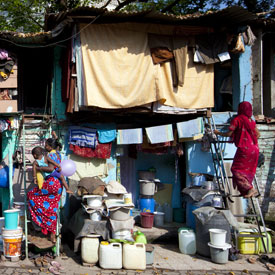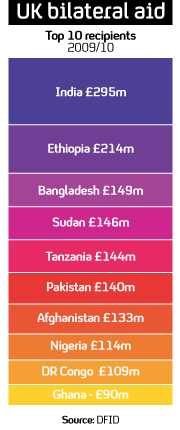UK-India row shows ‘politicisation of aid’
India does not want it – and many in Britain think we should not give it. But would a decision to abandon bilateral aid be more political than pragmatic?

There is more pressure from Conservative MPs to end to British aid to India – after the country’s finance minister said India wanted “voluntarily” to give it up. Philip Davies MP told the Daily Mail that it would be “extraordinary’, under the circumstances” to continue the aid programme.
It’s not the first time India – the world’s ninth largest economy – has indicated it no longer wants Britain’s cash. A leaked memo from the Indian foreign minister Nirumpama Rao back in 2010 criticised the “negative publicity of Indian poverty promoted by UK’s Department For International Development” and called for the assistance to end.
Britain currently sends some £260m a year to India – making it the largest bilateral aid programme. And far from cutting off the aid, last year the Development Secretary Andrew Mitchell approved another £1.1bn over the next four years, targeted at India’s three poorest states and especially at the very poorest women and girls.

India’s booming ecomony
Critics have pointed to India’s rapid economic development – with 7 per cent growth, its economy poised to overtake Britain in world rankings by 2022. It gives £3.5bn in aid to Africa, and is developing its own space project. At the same time, there are still 600 million people living on less than $2 a day: almost a third of the world’s poor. According to Mr Mitchell, British aid saves 17,000 lives a year – and he warned: “We will not be in India forever, but now is not the time to quit.”
But aid decisions are not made on purely humanitarian grounds – far from it. Indeed the coalition has put national security considerations at the heart of its international aid policy. A DFID policy document last spring talked of more emphasis on projects in “fragile states” which would focus on nation and peace building, to stop the development of potential threats to the UK.
That is why aid to countries like Afghanistan, Somalia and Yemen is being sharply increased, while the overall aid budget is being concentrated on 27 countries – either those with the highest levels of poverty, or those deemed failing states.
We will not be in India for ever, but now is not the time to quit. Andrew Mitchell MP
The UK is due to almost double spending in conflict-affected countries, from £1.8bn in 2010 to £3.8bn by 2014-15. That worries organisations like Oxfam, which has warned about what it calls the politicisation of aid.
A report issued last year claims that replacing decisions based on need with a policy based on national security issues means that countries deemed strategically important will end up getting disproportionate amounts of aid, to the detriment of other, equally poor neighbours.
But one final note on the aid destined for India. Ending a substantial donation that size would leave Britain unable to meet its Milennium Development Goal promise, to spend 0.7 per cent of GDP on aid. Last week the government delayed a decision to enshrine that commitment in law, despite a pledge in the Conservatives election manifesto and the coalition agreement.